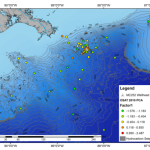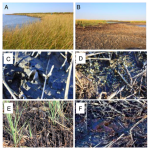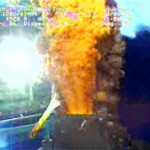Don’t be fooled by that fluffy, optimistic statistic you’re hearing all over the news this morning. The government is proclaiming that a whopping 75% of the oil has been “eliminated” from the Gulf.
First of all, you have to love how they’re using percentages. Even if we assume this statistic is absolutely correct, and only 25% of the oil is left in the Gulf, NPR calculates that this still leaves a staggering 1 million barrels floating around. That’s still bigger than the entire Exxon Valdez spill (where estimates ranged from 250,000 to 750,000 barrels spilled).
Secondly, the cheery terminology claims that oil has been “Eliminated”. Not so true. Sure, some light oil has certainly evaporated, but NPR reasons that this accounts for only 25-40% of the total. And yes, those heroic capture efforts to capture, skim and burn oil have taken care of an additional fraction—a whole 16%! The rest…“Mother Nature did her part” says Carol Browner, White House energy correspondent on the Today show this morning.
Right. So what she actually means is that we can’t see the rest of the oil, its lingering unseen in the water, and hopefully microbes are degrading it. Hopefully. Near visible oil, there appears to be a significant drop in oxygen levels, indicating microbial munching of hydrocarbons. But bacterial metabolism slows down markedly with depth, and this process slows down dramatically as oil disperses down through the water column. In a poignant article by Scientific American, Ronald Atlas of the University of Louisville clarifies the true timescale of microbial action:
The microbes break down hydrocarbons in “weeks to months to years, depending on the compounds and concentrations—not hours or days,” Atlas notes. “Much of the real tar or asphalt compounds are not readily subject to microbial attack…. Tar tends to persist. Asphalt tends to persist.”
But sediment, whether the muck of Louisiana marshland or the deep ocean seafloor, suffers from a dearth of oxygen. That means it’s up to anaerobic microbes—ancient organisms that live via sulfate rather than oxygen—to do the dirty work of consuming the spill. “What occurred in 10 days aerobically, took 365 days to occur anaerobically,” says Atlas of the breakdown of oil in the wake of the Amoco Cadiz spill off the coast of France in 1978. Adds Teske: “The heavy components are sinking to the sediment and forming an oily or tarry carpet or getting buried. Then they are much harder to degrade.”
In summary: the media may have declared this oil to be ‘eliminated’, but to us scientists, it is more visible in our minds than ever.
Statistics can be our friend, but not when they’re mangled and misused to imply that this situation is nearly solved.
Share the post "“Eliminated” oil is actually just invisible, and not stuck to birds"






This was just an embarrassment to listen to when I heard it on the radio. “Thanks for your concern, America. The Gulf will be okay. Move along, nothing more to see, we did our job and natural processes will take care of the rest.”
This reminds me of Rush Limbaugh’s pseudo-famous comment that the Gulf “will take care of itself.”
Jerks.
Thanks for this. The recent coverage of ‘oh, look! We can’t see it, so nature must have magically caused it all to disappear! See? That wasn’t so hard.” is supremely infuriating.
The article makes good points. But don’t blame the media for reporting this White House propaganda. Some of the reporting has noted some skepticism. Overall, this is not a good indication of adequate White House support for follow up on this disaster.
Just another reason I won’t believe the government about when it is safe to eat seafood from the Gulf.
On a more technical point, why didn’t the NOAA report distinguish between oil that evaporated vs. dissolved.
The fish,oyster,whale,otters,alligators,plankton,shimp,turtles,cattle birds and bugs soaked up all that oil and dispersant and died?UhhOhh.Might be hard to come back.That is barely scatching the surface?
Who is in control?The money holder.The false profit is in the pocket and bank accounts.Any entity funded will be hush hush.Fisherman are private enterprise.Controls of funding?Good business to start,red fish farm.Snapper of all kinds needed.
Hello,what about under ground streams?Dig into one inside a big city and it will probably be raw sewer.What is pollution anyway?Is a pack rat a polluter?